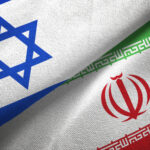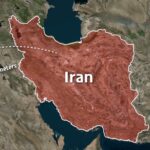Iranian missile strikes have hit key Israeli cities including Tel Aviv and Haifa, destroying homes and stoking international concern that the long-standing hostilities between Israel and Iran could explode into a broader regional war.
Israel’s Magen David Adom (MDA) emergency service confirmed on Monday that four people — two women and two men, all approximately 70 years old — were killed in central Israel following missile strikes at four separate locations. At least 87 others were injured.
In Petah Tikva, a city near Tel Aviv, officials reported that a missile struck a residential building, blackening concrete walls, shattering windows, and leaving several apartments heavily damaged.
Search and rescue operations were also underway in the northern port city of Haifa, where approximately 30 people were wounded, according to emergency authorities. Local media reported that fires were seen burning near a portside power plant.
The attack comes days after Israel launched a surprise assault on Iran’s nuclear program and top military officials. In response, Iranian state TV reported that the country fired at least 100 missiles at Israel on Monday, signaling a firm refusal to de-escalate amid mounting international pressure.
Iran’s Revolutionary Guards claimed the strikes used a new tactic that caused Israel’s multi-layered defense systems to engage with each other. This claim could not be independently verified. The Israeli military did not immediately comment on the method or outcome of the strikes, though officials have previously acknowledged the country’s defense systems are not foolproof.
Adding to the tensions, Israel’s Sunday strikes in Iran reportedly killed the head of the Revolutionary Guards’ intelligence division, Mohammad Kazemi, along with two other officers, according to Iran’s IRNA state media.
That same day, Israel said it had begun targeting surface-to-surface missile sites inside Iran. Images from Tehran showed a massive blaze lighting up the night sky at a fuel depot, as Israeli forces expanded their campaign to strike Iran’s oil and gas infrastructure — a move likely to impact both Iran’s economy and global energy markets.
In the days leading up to Monday’s strikes, at least 14 people — including children — were killed in Israel. Meanwhile, Iran’s health ministry reported that at least 224 people had died in the ongoing conflict, with 90% of the casualties said to be civilians.
Global alarm over the escalation has intensified just as G7 leaders convened in the Canadian Rockies, where the Israel-Iran crisis has quickly risen to the top of the agenda.
Before leaving for the summit, U.S. President Donald Trump told reporters: “I hope there’s going to be a deal. I think it’s time for a deal. Sometimes they have to fight it out.”
German Chancellor Friedrich Merz said his goals for the summit included “for Iran to not develop or possess nuclear weapons, ensuring Israel’s right to defend itself, avoiding escalation of the conflict and creating room for diplomacy.” He added, “This issue will be very high on the agenda of the G7 summit.”
Diplomatic efforts appear to be stalling. Iran has told mediators in Qatar and Oman that it is not open to negotiating a ceasefire while Israeli strikes continue, according to a source briefed on the communication.
In Washington, two U.S. officials told Reuters that President Trump had recently vetoed an Israeli plan to assassinate Iran’s supreme leader, Ayatollah Ali Khamenei. When asked about the report, Israeli Prime Minister Benjamin Netanyahu told Fox News: “There’s so many false reports of conversations that never happened, and I’m not going to get into that. We do what we need to do.”
Israel’s military campaign began Friday with a surprise strike that targeted the top echelon of Iran’s military leadership and nuclear facilities. In the hours following, Iran vowed to “open the gates of hell” in response.
Trump has lauded Israel’s offensive, denied Iranian allegations that the U.S. played a direct role, and warned Tehran against widening its retaliation to include American assets. Despite that stance, two U.S. officials said American forces had assisted in intercepting Iranian missiles heading toward Israel.
The U.S. president continues to argue that Iran could end the war by agreeing to tougher restrictions on its nuclear program — a program Iran insists is peaceful, but which Western nations and the International Atomic Energy Agency say could be used to produce nuclear weapons.
As fighting intensifies and diplomacy falters, world leaders now face a critical moment — with the risk of full-scale war in the Middle East looming larger by the hour.






